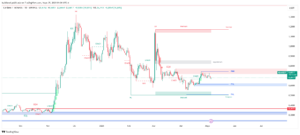
- Brazil’s Central Bank proposes banning stablecoin withdrawals to non-custodial wallets to tighten cryptocurrency transaction oversight.
- The proposed regulation aims to control capital outflow and redefine the forex market’s scope to include cryptocurrency activities.
The Brazilian Central Bank (BCB) has initiated a public consultation as of November 29, considering imposing a ban on transfers of stablecoins, such as Tether‘s USDT, to non-custodial wallets such as MetaMask.
The proposal is part of a draft regulation intended to reshape the cryptocurrency transaction landscape within the country. The BCB’s draft explicitly states,
“It is prohibited for providers of virtual assets to transfer virtual assets denominated in foreign currencies to a self-custodial wallet.”

This regulation is set to undergo a public consultation phase until February 28, 2025.
Expanding Oversight and Control
The motivation behind this regulatory push is to strengthen the Brazilian government’s oversight of the forex market. The BCB also aims to redefine the forex market to encompass activities like payments, sales, custody, and transactions in cryptocurrencies denominated in foreign currencies.
Such a redefinition would require Virtual Asset Service Providers (VASPs) to furnish the BCB with detailed customer verification data, transaction values, and other pertinent transactional information.
This move is reflective of a global trend towards stringent cryptocurrency regulations, particularly those that impact domestic economies and international financial transactions.
By expanding the definition of the forex market and demanding thorough data from VASPs, Brazil seeks to secure its economic stability and oversee the flow of its capital abroad more effectively.
The Role and Risks of Non-Custodial Wallets
Non-custodial wallets offer users full control over their digital assets without intermediary oversight, providing a degree of financial freedom but also posing significant regulatory challenges.
These wallets allow for a level of anonymity and control not required by centralized exchanges, which are bound by Know-Your-Customer (KYC) protocols. The BCB’s initiative reflects a strategic effort to bridge the gap in financial regulation that non-custodial wallets represent, potentially closing a loophole in financial oversight.
The significance of this proposal is magnified by the growing popularity of stablecoins in Brazil. Stablecoins are cryptocurrencies whose value is pegged to a stable fiat currency, such as the US dollar, offering less volatility compared to other crypto assets.
The introduction of Circle’s USDC in Brazil, enabling fast and secure transactions through national real-time payment systems, highlights the rapid adoption of these digital currencies.
Brazil, a vibrant market for cryptocurrencies in Latin America, is proactively setting measures to ensure that financial innovations do not compromise the economic stability or security of its citizens.
As one of the key players in the global cryptocurrency field, Brazil’s regulatory approach could set a precedent for other nations grappling with similar issues.

The post Brazil Moves to Ban Stablecoin Withdrawals to Non-Custodial Wallets in Regulatory Shake-Up appeared first on ETHNews.


